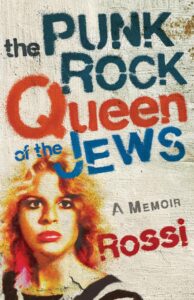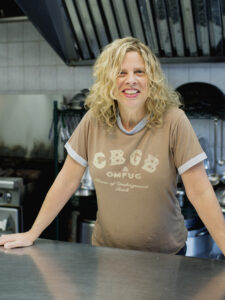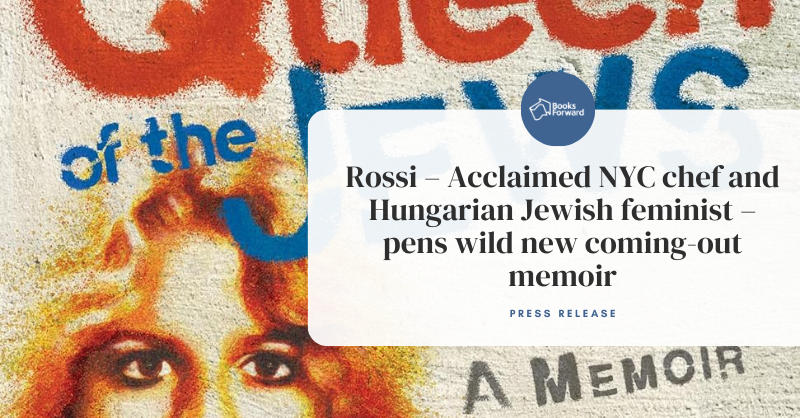 NEW YORK – Officially designated a “rebel” by The New York Times and “the wildest thing this side of the mason Dixon line” by Zagat, Rossi is releasing “The Punk Rock Queen of the Jews” (She Writes Press, April 23, 2024), her outrageous, queer coming-of-age story.
NEW YORK – Officially designated a “rebel” by The New York Times and “the wildest thing this side of the mason Dixon line” by Zagat, Rossi is releasing “The Punk Rock Queen of the Jews” (She Writes Press, April 23, 2024), her outrageous, queer coming-of-age story.
Rossi was taught only to aspire to marry a nice Jewish boy and to be a good kosher Jewish girl. At 16 she flowers into a rebellious punk-rock rule-breaker who runs away to seek adventure. Her freedom is cut short when her parents kidnap her and dump her with a Chasidic rabbi — a “cult buster” known for “reforming” wayward Jewish girls — in Crown Heights, Brooklyn.
Rossi spends the next couple of years in a repressive, misogynistic culture straight out of the nineteenth century, forced to trade in her pink hair and Sex Pistols T-shirt for maxi skirts and long-sleeved blouses and endure not only bone-crushing boredom but also outright abuse and violence.
“The Punk Rock Queen of the Jews” is filled with wonderfully rich characters, hilarious dialogue, and keen portraits of the secretive hothouse Orthodox world and the struggling New York City of the 1980s: dirty, on the edge, but fully vital and embracing.
“The Punk Rock Queen of the Jews: A Memoir”
Rossi | April 23, 2024 | She Writes Press | Memoir
Paperback | ISBN 978-1647426972 | $17.95
About the Author
 Rossi has been published in outlets including The Daily News, The New York Post, Time Out New York, and Mcsweeney’s, to name a few. She has been the food writer of the “Eat Me” column for Bust magazine since 1998, hosts her own hit radio show on WOMR and WFMR in Cape Cod called Bite This, now in its nineteenth season, has been featured on The Food Network and NPR and has been a popular blogger for The Huffington Post. Her first memoir, “The Raging Skillet: The True Life Story of Chef Rossi” was published by The Feminist Press to rave reviews. In addition to memoir, Rossi has written two full-length plays, a number of one-act comedies, a one-woman stage adaptation of Queen of the Jews, and launched the Raging and Eating podcast. Find out more about her at www.theragingskillet.com.
Rossi has been published in outlets including The Daily News, The New York Post, Time Out New York, and Mcsweeney’s, to name a few. She has been the food writer of the “Eat Me” column for Bust magazine since 1998, hosts her own hit radio show on WOMR and WFMR in Cape Cod called Bite This, now in its nineteenth season, has been featured on The Food Network and NPR and has been a popular blogger for The Huffington Post. Her first memoir, “The Raging Skillet: The True Life Story of Chef Rossi” was published by The Feminist Press to rave reviews. In addition to memoir, Rossi has written two full-length plays, a number of one-act comedies, a one-woman stage adaptation of Queen of the Jews, and launched the Raging and Eating podcast. Find out more about her at www.theragingskillet.com.
Follow Rossi on social media:
Facebook: @chefrossinyc | Twitter: @chefrossi | Instagram: @chefrossinyc
In an interview, Rossi can discuss:
- Her identity as a rebellious punk rock rule-breaker, an adventure-seeker and a gay Hungarian Jewish feminist with a Yiddish-Jersey-Southern accent
- Finding yourself amid restrictive cultural expectations
- Her experience being forced to live under the care of a “cult busting” Chasidic rabbi who aimed to “reform” wayward Jewish girls
- Breaking out of a repressive, misogynistic culture in which she endured abuse
- Facing the constant threat of assault, prejudice, homophobia, homelessness and violence
- Her decision to confront her past and make peace with it
- Trying to survive her own personal crisis amid larger cultural crises (AIDS in NYC, racial unrest, 9/11)
- Advice to young people facing similar challenges and pressures to conform
- Balancing her Jewish faith with her gay soul
Early Praise for Rossi
and “The Punk Rock Queen of the Jews”

“I thought I’d heard everything until I read Rossi’s memoir. It’s a story of resilience, acceptance, food, love, chosen family and the chosen people. What more could you want?”
—Judy Gold, comedian, actress, author, and two-time Emmy winner
“Raised during and after the Holocaust, Rossi’s parents tried desperately to breed fear into their children—of outsiders, of losing touch with the Jewish community, of a demanding God—but Rossi was fearless and hungry for experience. Which explains, and doesn’t, why one day her parents dropped their rebellious lesbian daughter off among the Lubavitch Hasidim to ‘keep her safe’ in a dangerous drug-ridden area of New York City. Rossi was sixteen. The rest can be read as the funny, terrifying coming-of-age/coming-out of one intrepid soul, or as a vibrant portrait of 1980s New York, or as an underbelly view of Crown Heights, because Rossi does it all in this exhilarating, satisfying read.”
—Leah Lax, author of “Uncovered”
“When Rossi was sixteen her small-minded parents, terrified of her queerness, sent her to live with Lubavitchers in pre-gentrified Crown Heights, Brooklyn. Because she escaped with her humor and integrity intact, we have this fascinating memoir unveiling the interior life of this cult-like religious Jewish community. While the expected bullying and misogynistic elements are revealed in detail, we also see the misfit subculture of Chasidim. Rossi encountered the Lubavitcher queers, the dopers, the dealers, the thrill-seeking and free-thinking men and women living on the edges of this ultra-conformist society. Her ride is a fascinating one, not only to a lesbian life but also perhaps the more difficult path of challenging the anti-Black racism of both her parents and the religious Jews. A page-turner.”
—Sarah Schulman, author of “Let the Record Show” and “Conflict Is Not Abuse”
“Somehow, despite finding herself in tremendously challenging, oppressive, and at times dangerous situations, Rossi holds onto her strength, her rage, her humor, her joy, her neshama (soul) and her heart. . . . This wild ride of a memoir pays tribute to the human spirit. It is an amazing book; I couldn’t put it down.”
—Lesléa Newman, author of “A Letter to Harvey Milk” and “Heather Has Two Mommies”
“The Punk-Rock Queen of the Jews: You have to read it to believe it. A rollercoaster ride of a not-so-good Jewish girl and her road to redemption. Get ready for jail time, cult busters, flying beef stew, and finally, a great original chef named Rossi.”
—Tovah Feldshuh
“Chef Rossi’s intensely personal recollection of Yom Kippur services, September 26, 2001, offers me—the rabbi who led them—a new perspective on an already unforgettable event. Rossi is a very special storyteller. . . . Take my word about the book as someone in the book: READ the book.”
—Rabbi Sharon Kleinbaum, Senior Rabbi, Congregation Beit Simchat Torah, world’s largest LGBT synagogue
An Interview with Rossi
Before we dive into everything else, can you give us a glimpse into your childhood? What was your family like?
I had a spectacularly unusual childhood that was half trailer park trash and half Orthodox Jewish, with an eccentric, mentally questionable Yiddish mama. My parents wanted me to raise me as a nice Jewish girl with 1950’s values. I started rebelling almost from birth.Why did you rebel? Why did you run away from your safe home for a dangerous one?
I could not tolerate the double standards of what boys can do and girls can not do. I knew it was wrong. I knew girls could do anything boys could do, if they weren’t held back. My parents wanted a sweet little girl without much independence. I was not so much a rule breaker as a rule changer. I wanted to change the world
You eventually ran away as a teenager, but your first taste of freedom was cut short when you were arrested at 16 years old. Your parents forced you to move to Crown Heights, Brooklyn, to live under the watchful eye of the “cult busting” Chasidic rabbi, known for reforming wayward Jewish girls. How did this experience shape who you are today?
At the core of who I am today is that terrified rebellious teenage girl, who had to push aside her fear to rise up and climb out of a dark time filled with the constant threat of assault, prejudice, homophobia, homelessness, and finally, shocking violence from the least likely source she could imagine. So yeah, I’m a survivor. “New York Tough,” I like to say, but I understand the power of a simple gesture of kindness from a stranger. A kind word, a gift, a helping hand, these things saved my life. I pass it on, every chance I get.
How did that time in your life affect your relationship with your family?
When I was trying to survive Crown Heights, my feelings for my parents were pure rage. All my strength and bravery seemed to be fueled by fury. It wasn’t until I stopped running and fighting that I slowed down enough to start feeling softer towards my parents, but it took years for us to reconcile.
How did you escape? How did you survive?
I finally escaped with grit and personality, a good phone voice and a little help from whoever is up there. All of these experiences made a ladder that fed into who I am today. My time surviving Crown Heights gave me the grit and courage to become a female chef in a male world, to start my own business, to go to Ground Zero after September 11th. My time there fed everything I am today.
You identify as a rebellious punk rock rule-breaker, an adventure seeker and a gay Hungarian Jewish feminist. How did these norm-bending characteristics reveal themselves over time?
I think I was born a feminist. I started complaining about the double standards my parents had almost immediately. Why can’t girls do that? That’s not fair! I was always angry. I didn’t want to be the kind of girl I saw on TV. I wanted to be the Fonz!
How did you find strength to embrace the ways in which you differed from your community, especially with your family pushing so hard for you to assimilate?
My strength came from needing to be me. It seemed that no one I met was living their own life. They were living a life told to them or taught to them. I called bullshit. I wanted and demanded to live MY LIFE. I never stopped. I am flawed for sure. But I am ME.
Your religion and upbringing made it hard to come out — what advice would you give to others coming to terms with their identity and trying to live authentically despite what is “expected” of them?
It can be terrifying to come out in a repressive religious community. But the price for not coming out is a life in a prison. Coming out frees your mind, body and soul. Once I came out, I never looked back. Close your eyes and jump in. That gorgeous lavender ocean is waiting for you, and the water is fabulous.
It’s interesting; you strived to survive intolerance, abuse and oppression, all while the city you lived in – New York – was also surviving cultural tragedies, including the AIDS crisis, racial unrest and 9/11. How do you think the cultural issues around you informed your own approach to your life? How much of your identity is defined by you being a New Yorker? How would you be different if you didn’t grow up in NYC?
I think about this all the time. What would my life be like if I never ran away from home? Who would I be if I never moved to NYC? My friends all say I would have wound up in NYC anyway, that I was born to live in New York City. I think they’re right. A lot of people in my life think I’m a quintessential New Yorker. I don’t know. I know I hate wearing colorful clothing. I love black and dark blue. I have no patience for slow walkers. I walk everywhere, often 10 miles without thinking about it. I am bluntly honest. I have no patience for time-wasters. So yeah, NYC baby! I see a huge difference in people who moved to New York after it became a “safe” city, after it got pricey and started to feel more like Boston than New York. I’m old school. I see NYC as my baby. I don’t miss the crime, but I do miss the edge. I miss the mom and pop stores. I miss the bodegas all selling pot. I miss the punk rockers. I even miss the hookers in Time Square. The AIDS epidemic changed me forever. That was when I realized you can not sit quietly while people you love are dying. You have to march, fight, scream and demand attention. I was at a rally in Union Square Park and heard Larry Kramer rallying up the crowd for ACT UP. I was never the same. Am I a New Yorker? Yes, but I’m a pre-911 New Yorker. Proud of it.
What’s next for you?
I’ve written the screenplay for “The Punk Rock Queen of the Jews.” I so see it as a movie. It really needs to be a movie. I see Natasha Lyonne playing me. Weird, edgy, rebellious and Jewish. She’s perfect.

A former award-winning journalist with national exposure, Marissa now oversees the day-to-day operation of the Books Forward author branding and book marketing firm, along with our indie publishing support sister company Books Fluent.
Born and bred in Louisiana, currently living in New Orleans, she has lived and developed a strong base for our company and authors in Chicago and Nashville. Her journalism work has appeared in USA Today, National Geographic and other major publications. She is now interviewed by media on best practices for book marketing.

